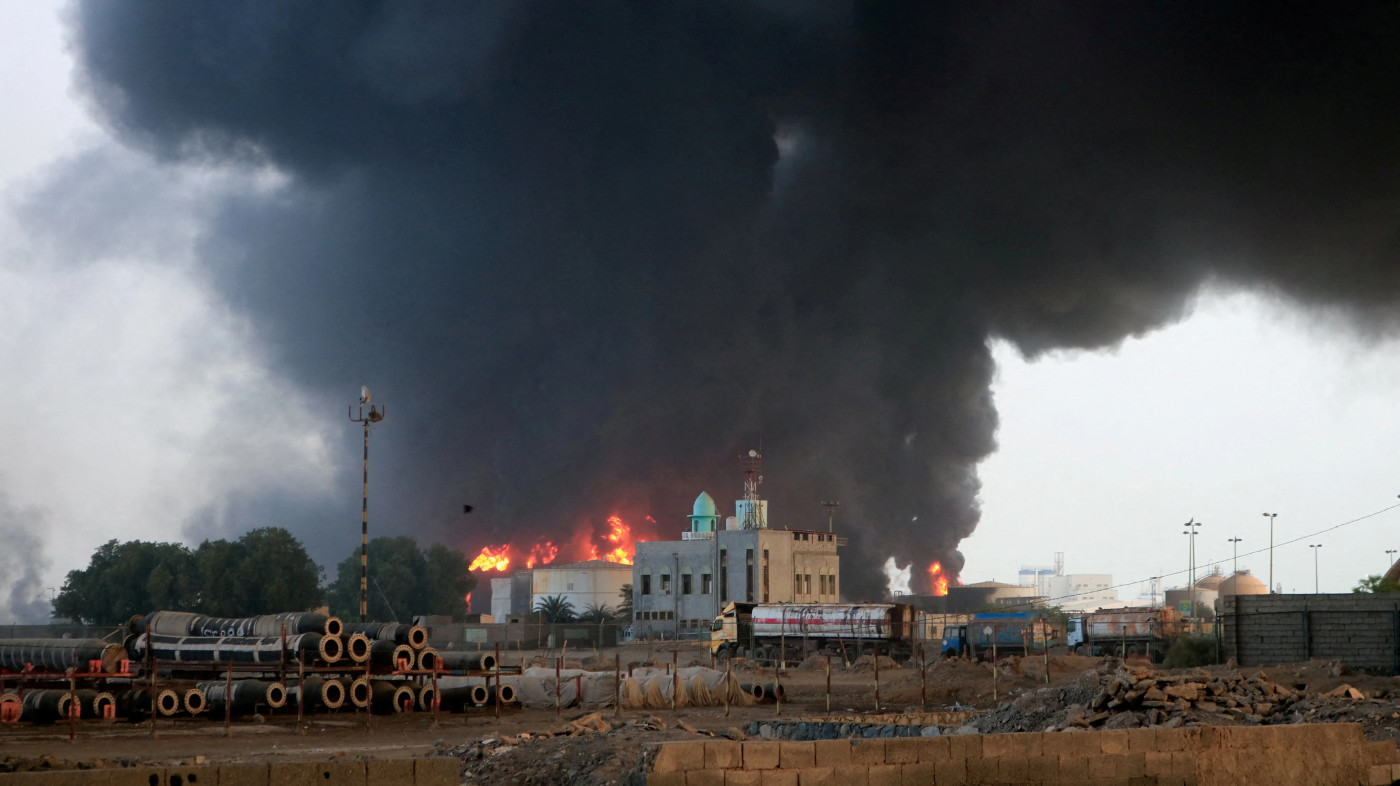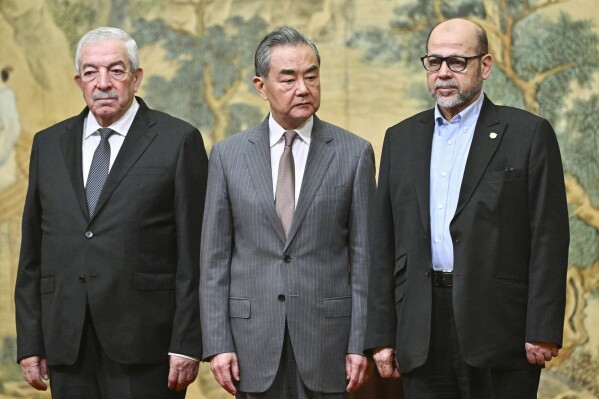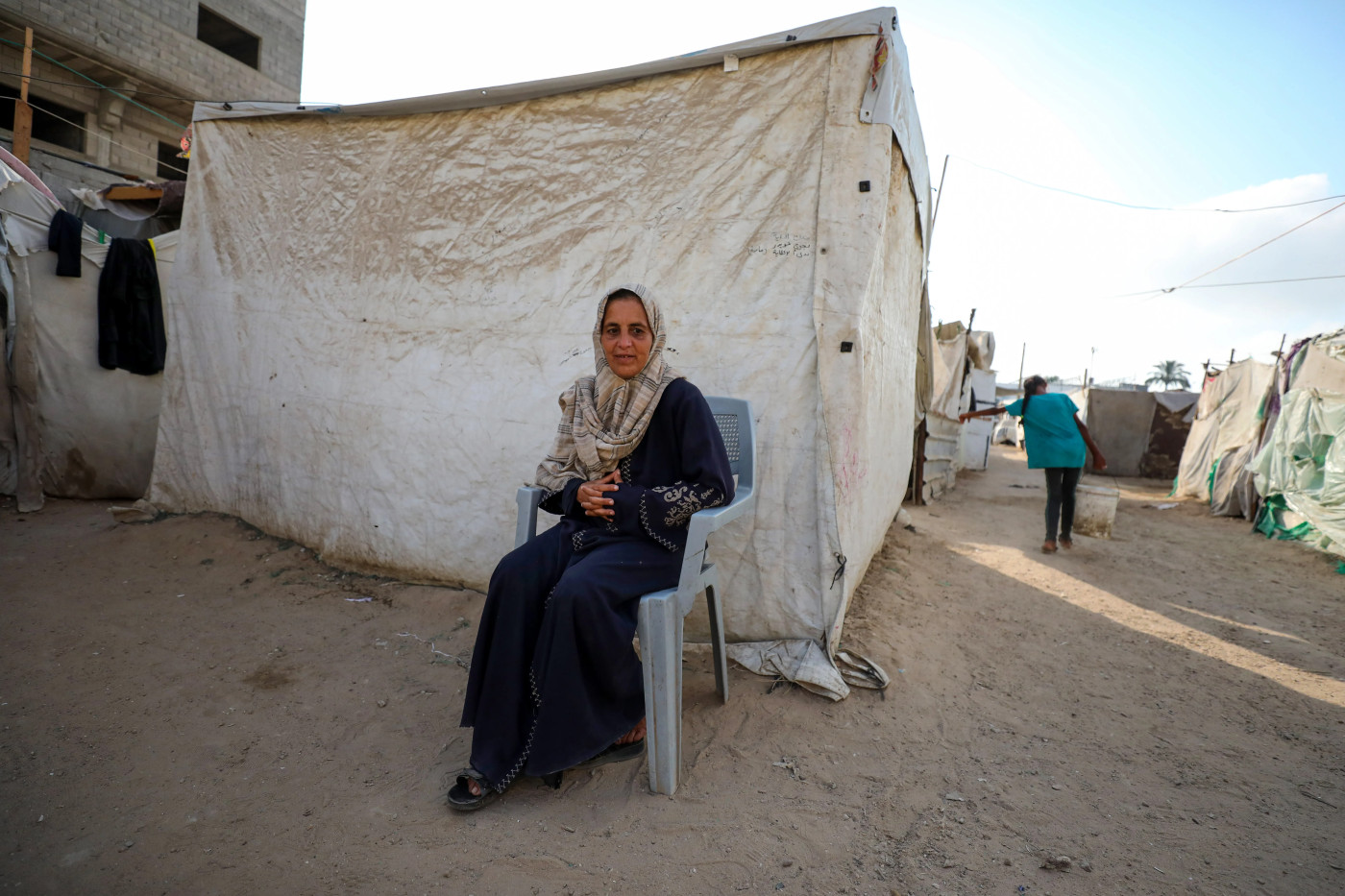What Palestinians Agreed to in China and Why It Matters
Palestinian factions have issued a joint statement following a high-profile meeting in China, pushing to overcome long-standing divisions that threaten to further undermine aspirations for statehood amid the ongoing war in the Gaza Strip.
The eight-point declaration, shared with Newsweek on Tuesday by a senior Hamas official, was signed by leading factions Hamas and Fatah, along with a dozen other Palestinian groups in attendance. It called for the establishment of a unified government across Gaza, the West Bank and Jerusalem to bolster efforts to end the Israel-Hamas conflict in Gaza, expel Israeli occupation from Palestinian territories and rebuild in the wake of the longest and deadliest flare-up of Israeli-Palestinian violence to date.
The move marks the latest attempt to mend the rift that first erupted when Hamas seized control of Gaza amid clashes with Fatah in 2007, a year after the Islamist group came out ahead in the last elections to be held by the West Bank-based and Fatah-led Palestinian National Authority (PA) and two years after Israel fully withdrew from decades of military rule over Gaza.
Previous efforts toward reconciliation have unraveled but the latest bid comes with the backing of China, which has demonstrated a greater focus on Middle East diplomacy with its successful brokering of a landmark agreement between Iran and Saudi Arabia in March 2023.
Shen Shiwei, journalist and nonresident research fellow at Zhejiang Normal University's Institute of African Studies, called it "a milestone for Palestinian and regional peace" that contrasted from the approach of the United States, which has traditionally led peace efforts in the decadeslong Israeli-Palestinian conflict.
"From a historical perspective, the U.S. has definitely been a major influence in terms of bringing peace," Shen told Newsweek. "But why have they failed again and again? One major reason is that some politicians on Capitol Hill don't want to make any impartial policies towards the region, which is why we have seen widespread campaigns against the U.S. and some Western countries' ignorance of the rights of Palestinian people."
Newsweek has reached out to the Chinese Embassy to the U.S., the office of Israeli Prime Minister Benjamin Netanyahu and the U.S. State Department for comment.
Israeli Foreign Minister Israel Katz swiftly denounced the deal as well as PA President Mahmoud Abbas for endorsing it at a time when Netanyahu has vowed to deliver a decisive defeat to Hamas and expand Israel's control over Gaza.
"Hamas and Fatah signed an agreement in China for joint control of Gaza after the war," Katz wrote on X, formerly Twitter. "Instead of rejecting terrorism, Mahmoud Abbas embraces the murderers and rapists of Hamas, revealing his true face. In reality, this won't happen because Hamas's rule will be crushed, and Abbas will be watching Gaza from afar. Israel's security will remain solely in Israel's hands."
The text of the joint Palestinian declaration reached in Beijing called for the formation of a "temporary national consensus government" that "will exercise its powers and jurisdiction over all Palestinian territories in a way that confirms the unity of the West Bank, Jerusalem and the Gaza Strip, provided that the government begins unifying all Palestinian institutions in the territory of the state."
Other aspects of the agreement called for "unifying national efforts to confront the Zionist aggression and stop the war of genocide carried out by the occupying state and herds of settlers with the support and participation of the United States of America," noting that this effort takes place "under the umbrella and auspices of the United Nations and with broad international and regional participation as an alternative to unilateral and biased American sponsorship."
Following the meeting, Chinese Foreign Minister Wang Yi stated that "the core outcome is the affirmation of the Palestine Liberation Organization (PLO) as the sole legitimate representative of all Palestinian people; the biggest highlight is the agreement on establishing an interim government of national reconciliation focusing on the post-conflict reconstruction of Gaza; and the strongest call is for truly establishing an independent State of Palestine in accordance with relevant U.N. resolutions," according to a readout issued by the Chinese Foreign Ministry.
While Netanyahu has yet to release a comprehensive plan outlining the future of Gaza in the event of Hamas' defeat, a spokesperson for his office has previously told Newsweek that such a vision includes "a demilitarized territory and a de-radicalized society, potentially run-by local civil administrators who have no link to terrorism."
The plan would also, "for the foreseeable future," see Israel "maintain some security responsibility over the Gaza Strip to make sure that we don't see a resurgence of terrorism," the spokesperson said at the time.
The White House, however, has called for a return to PA rule over Gaza and, as of May, has sought to implement a three-phase road map for ceasefire, the exchange of prisoners, the withdrawal of Israeli forces and the reconstruction of Gaza. The deal was initially welcomed by Hamas but conflicting narratives over its contents have emerged in recent months, and talks taking place in Cairo have yet to achieve a breakthrough.
Responding to questions regarding the agreement at a press briefing Tuesday, U.S. State Department spokesperson Matthew Miller said he had not yet reviewed the text of declaration but asserted that it was the Biden administration's position that "Hamas is a terrorist organization" and, therefore, "there can't be a role" for the group in post-conflict Gaza.
Though Hamas did acknowledge the PLO, the coalition of largely secular and left-wing Palestinian factions that is led by Fatah and does not include Hamas, as "the sole legitimate representative of the Palestinian people" as part of the agreement, Miller argued that Hamas had yet to truly "accept the principles" of the PLO as Hamas "has not renounced terrorism, it has not renounced the use of violence to achieve its political aims, it has not renounced the destruction of the State of Israel."
But citing Secretary of State Antony Blinken, Miller said that China did have the potential to play a "constructive role" in the Middle East, and that the Biden administration has "encouraged" China to "use their influence with countries in the region, especially countries with whom they have a relationship with," particularly Iran.
Ultimately, Miller argued that the declaration was unlikely to influence the ongoing negotiations in Egypt toward the U.S.-backed plan.
"We don't think anything related to this declaration should in any way have an impact on the ongoing discussions to reach a ceasefire," Miller said. "We think it's an agreement is in sight. It's achievable. It doesn't mean we'll get there, but we have made progress in the talks."
But in the absence of palpable movement under the U.S.-led initiative, Shen saw an opportunity for China to step in, as well as the potential pitfalls in doing so given past failures following summits held in Algeria, Egypt, Qatar, Russia, Saudi Arabia and Yemen over the years.
"How can China navigate this sensitive issue? One reason is that China has upheld the principle of 'Palestinians governing Palestine' in pushing peace efforts in recent years," Shen said. "The other important one is to listen to the demands and concerns of relevant parties, which is essential for an impartial reconciliation since regional affairs are very complicated and sensitive."
"In the past months, China has sent veteran envoys to the region for shuttle diplomacy to have more in-depth talks with parties of concern based on mutual respect," he added. "That's why Fatah and Hamas held talks on promoting intra-Palestinian reconciliation in Beijing at the end of April. And that has paved a solid foundation for the latest reconciliation achievements."
Shen pointed out that China enlisted a broad coalition of stakeholders to attend the meeting as well, including top diplomats and senior representatives from Algeria, Egypt, Lebanon, Jordan, Qatar, Russia, Turkey, Saudi Arabia and Syria.
Beijing, which oversees the world's largest diplomatic network, also brings its own heavy geopolitical and economic weight to the negotiating table. China has a long history of backing Palestinian factions in their fight for statehood dating back to the early days of the Cold War, but this stance shifted toward the end of the century and the People's Republic began establishing more robust relations with Israel after establishing formal diplomatic ties in 1992.
The two nations announced their "innovative comprehensive partnership" in 2017, but ties between China and Israel have once again hit serious snags with Beijing's inroads to Hamas and growing ties with Iran, whose allied Axis of Resistance coalition has unleashed daily attacks against Israel since the beginning of the war in Gaza in October.
The latest step, formally called the "Beijing Declaration on Ending Division and Strengthening Palestinian National Unity," envisions its own three-step process toward resolving the conflict. The first calls for an immediate ceasefire along with an accelerated flow of humanitarian in Gaza, the second paves the way for the establishment of joint Palestinian governance in Gaza and the third marks a path for full Palestinian membership in the United Nations.
Shen called it "a major step forward," though he acknowledged "it's definitely not an easy job to achieve a long-lasting peace." Such an endeavor, he noted, still requires "a lot of work."
Khaled Elgindy, senior fellow at the Middle East Institute and former PA negotiator, argued that "China, of course, is trying to position itself as a major political player in the region, especially as the intra-Palestinian files is not something Washington can or would take on."
But he also expressed some skepticism toward the hopes for progress outlined in the document.
"Sadly, I don't think there is much new in this latest declaration from Beijing," Elgindy told Newsweek. "Given the unprecedented, even existential, threats Palestinians are facing in both Gaza and the West Bank, there is an urgent need for a unitary and coherent political leadership."
"Both Hamas and Fateh understand this and need to project progress on the domestic reconciliation front, but what came out of Beijing is mostly a reiteration of previous principles," he added. "There is general agreement (and has been for some time) on the need for a national consensus government, restructuring the PLO, Gaza reconstruction, etc., but there is no agreement on the details or on the exact steps for implementation."
The problem is partially rooted in the uncertainty that the future of 88-year-old Abbas and PA leadership face amid a historic legitimacy crisis exacerbated by the front-line role of Hamas and other factions in the war in Gaza, growing Israeli military and settler activity across the West Bank and frequent accusations of corruption. Polls continue to show that Hamas overwhelmingly outranks Fatah in terms of popularity.
In addition to Hamas and Fatah, other groups in attendance at the Beijing meeting included the Popular Front for the Liberation of Palestine, the Democratic Front for the Liberation of Palestine, Palestinian Islamic Jihad, the Palestinian People's Party, the Palestinian Popular Struggle Front, Palestinian National Initiative, the Popular Front for the Liberation of Palestine General Command, the Palestinian Democratic Union, the Palestinian Liberation Front, the Arab Liberation Front, the Palestinian Arab Front and Al-Saiqa.
With the Hamas-led war effort drawing increasing support among Palestinians despite condemnation from Israel and the U.S., a shift could see Abbas further isolated.
"Abbas in particular is not in a hurry to move ahead with reconciliation, both because he does not want to share power with Hamas and because doing so would likely invite direct retaliation from Israel and probably Congress as well," Elgindy said. "The sad reality is that, as long Abbas is alive, I doubt we will see any real progress on the reconciliation front."
Disclaimer: The copyright of this article belongs to the original author. Reposting this article is solely for the purpose of information dissemination and does not constitute any investment advice. If there is any infringement, please contact us immediately. We will make corrections or deletions as necessary. Thank you.


